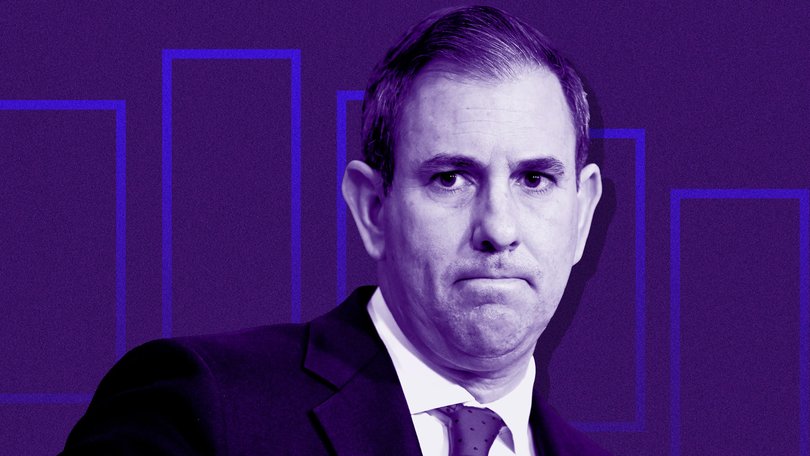ANDREW CARSWELL: Jim Chalmers loses control of economic debate ahead of high-stakes productivity summit
ANDREW CARSWELL: Jim Chalmers’ hands-off approach to next week’s productivity summit has left the economic agenda wide open for others to shape.

It may have been a well-intentioned move to spark debate about Australia’s lagging productivity.
And perhaps even noble to leave the vision board blank, giving participants a clean slate to pitch ideas free from political or policy guardrails.
But by refusing to engage with policy ideas ahead of his economic roundtable next week, Treasurer Jim Chalmers has ceded control of one of the most important, yet unheralded elements of his job: control of the economic narrative.
Sign up to The Nightly's newsletters.
Get the first look at the digital newspaper, curated daily stories and breaking headlines delivered to your inbox.
By continuing you agree to our Terms and Privacy Policy.It remains a puzzling tactic to give every interest group in the country free rein to publicly push their pet ideas on productivity, taxation, and regulation in the media in the lead-up to the roundtable, with no yay or nay response or guidance from the Government. No rule in, no rule out.
The result has been a cacophony of noise. A muddle. A boisterous game of one-upmanship and ripostes from business groups, economists, unions, social advocates and commentators, each vying for ascendancy, each trying to set the ground rules, each swatting away detractors and shaping the outcome to suit their own ends.
A daily drumbeat of “new” ideas. Put taxes up, put taxes down. Raise company tax, cut company tax. Hike the GST, broaden the GST. Introduce more levies, scrap the levies. Increase regulation, decrease regulation. More AI, more control of AI. Red light, green light.
The Productivity Commission used the free-for-all to flood the media market with a catalogue of ideas, each sparking its own commentary, counter-claims, and policy posturing.
It was the most productive the Productivity Commission had been in decades — a timely reminder that it still existed. That its relevance somehow defied its lack of results. Perhaps eager to make up for lost time, the PC fired off a volley of ideas, seemingly blind to the irony that Chalmers had convened the summit to fix the very productivity slump the commission had presided over for years. It was akin to an assailant providing tips on how to revive the patient they’d just stabbed.
But anyway, the ideas kept flowing, back and forth, with the Treasurer keeping his whistle in his pocket, unwilling to intervene in the melee.
Leading to an inevitable outcome: Chalmers lost control of the economic narrative.
That may seem innocuous enough.
But at a time when economic growth is sluggish, productivity is underperforming, and investment is drying up, it is crucial that Australia’s leaders project strength and confidence in the economy. That they are the predominant voice. Markets, investors, and households alike take their cues from that confidence. Without it, uncertainty grows, decisions are deferred, and the cycle of weakness deepens.
International investors must have looked upon Australia throughout the past month with mouths agape, wondering what on earth was going on, or more importantly, what investment climate would greet them when the dust finally settled.
Are taxes going up or down? Will there be more regulation or less regulation? Is Australia serious about investment in AI and digital infrastructure, or is it too risk-averse and insular?
Too many questions. Not enough answers from Canberra.
It is a funny way to run a conversation about the economy.
Similarly, a poor way of managing expectations.
By outsourcing the economic narrative to every interest group in the country and handing authorship of the agenda to self-interested players, the Government created expectations it could never hope to meet.
With a steady stream of big ideas splashed across the media, Australians could be forgiven for thinking the Treasurer was gearing up for sweeping reforms, based on the notion that such a big deal event would deliver big things. A final communique about red tape reduction just ain’t gonna cut it.
The Treasurer has inadvertently raised expectations to a level that now risks his own failure.
Because big reforms are simply not what the Albanese Government does. That’s not an overt criticism, just an observation grounded in past performance and based on the immutable realities of a multicoloured Senate and an increasingly polarised media landscape. Big reforms are hard and getting harder.
This reality has caused a clear schism between a Treasurer desperate for renown as a reformer to mirror his idol, Paul Keating, and a Prime Minister who prefers a steady-as-she-goes approach to guarantee longevity.
Anthony Albanese rocked the boat once. It was called the Voice. And got drenched in the process. He won’t do it again.
To have us believe, as the PM routinely implores, that he won’t consider big-ticket reforms without taking it to an election to get a mandate, is to indulge fiction.
This is about longevity and not squandering its commanding electoral advantage — even in the national interest.
If you were waiting for more evidence, along came the Prime Minister last week to put the genie back in the bottle and finally put some guardrails around the economic summit. In one stroke, he doused any talk of big-ticket reform by declaring that no new taxes would be on the table.
Doing the Treasurer’s job for him.
Andrew Carswell is a former adviser to the Morrison government
